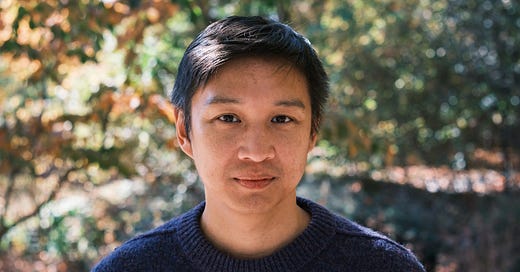It’s crazy that we have to do this
An outtake and afterthought from my conversation with Kevin Nguyen
Welcome to Human Pursuits, the column that features need-to-know names and stories in media and other creative spaces. Today, an outtake from my conversation with Kevin Nguyen – and an afterthought on algorithms and Netflix’s Adolescence.
Read part 1 of our conversation HERE.
Outtake
ES: I don’t know what a popular post looks like on PI.FYI, which is maybe the point? I’ve had things get a bunch of likes, but I don’t know if that’s considered going viral. I’d rather not know, to be honest.
KN: That’s nice. I used it when it launched. I felt like it had flatlined a bit, culturally, but maybe it’s picking up. I remember someone recommended pizza. Like, come on. Laughs.
ES: Yeah, it’s interesting. Obviously, I’m not using the app with the intention of actioning every recommendation. It’s cool to see what people are talking about, especially because many PI.FYI users are younger than me. I like to know what Gen-Alpha is up to. It’s also a good temperature check on people in New York.
KN: It certainly has that Lower East Side vibe, which I guess I’m around all the time. I feel like if I spent more time there, I would try to find people who only posted music recommendations. That would be nice. I think it’s true and fair to say you need to put in work to get utility out of most things. I’m not on TikTok, and every time it comes up, my kid sister tells me “You’ve just got to train your algorithm”. It breaks my brain. I’m not training an algorithm.
ES: Totally. and I were chatting about this at one point. Everyone loves to complain about the algorithm, but the internet you get is the one you invest in. When I first downloaded TikTok it was horrifying. The app had very little information about me and my preferences. Because it knew my gender it tried to suck me into the Manosphere. It was absolutely bananas. Like, videos of Joe Rogan and guys shooting guns and “EPIC FAIL” compilations. I got Leah to send me a bunch of cute animal videos so that I could like them and try to tame the beast, but it was a scary time.
KN: I’m in a similar situation where my YouTube algorithm is pretty fucked because I pay attention to what the Incel gamers are talking about. There’s one horrible Twitch streamer named Asmongold. I clicked one of his videos and now it’s all I get.
ES: I try to avoid hate watching for that very reason. I want my YouTube algorithm to reflect my interests. I’ll go incognito mode for any problematic stuff I need to look at. But that feels inconvenient. It’s annoying that I have to do that
KN: I know. I pay for YouTube Premium because I don’t want any ads. I’m not gonna go incognito mode to watch some Incels talking and watch a bunch of ads. It’s crazy that we have to do this.
Afterthought
This weekend, Leah and I watched Adolescence on Netflix. The limited series tells the story of a 13-year-old boy, Jamie, who is accused of murdering a young girl, and how the crime affects his family, school, and community. It was compelling from both a narrative and technical perspective, and I wouldn’t be surprised if it wins an Emmy or two.
It was also, frankly, bone-chilling.
As with Kevin’s book, I was initially hesitant to engage with the show because of its heavy subject matter. I figured it would leave me feeling depressed about the state of the world. It did, to a certain extent. It helps, however, that the show views itself as a jump-off point for a broader dialogue about the way attitudes and ideas are spread, and who bears responsibility if they lead to action.
Without spoiling too much, at one point Jamie’s parents reflect on his anti-social tendencies, and how those were fed into by technology. They reflect on their decision to buy him a computer, and how he spent hours alone in his room. “All kids are like that these days,” muses his dad, Eddie. “You don’t know what they’re watching… Look at that fella that popped up on my phone, going on about how to treat women, how men should be men… I was only looking for something for the gym.”
The implication is that men are being fed misogynistic content, even if they don’t want it. But that’s only half true. Users do still have some power in developing their feed and training their algorithm. Yes, we have ceded most of the decision-making to the tech companies and their codes. But not all of it.
As Kevin said in the first part of our conversation, “users do willingly volunteer a lot of information” on social media. He believes that willingness shouldn’t excuse tech companies from storing and potentially (definitely???) using our data as they want.
I agree. Ideally, we would all quit these apps cold turkey. There’s little movement on that front, though. Feed architecture might be our best option.
On Friday, I saw a video of Brand New’s first public performance since their singer was accused of sexual abuse and soliciting explicit photographs from a 15-year-old girl. I sensed the algorithm was teeing up to serve me as many angles of the concert as it could find. So I performed evasive maneuvers. I clicked the arrow in the bottom right corner of TikTok and selected “Not interested.”
It took me exactly three seconds. It worked like a charm.





